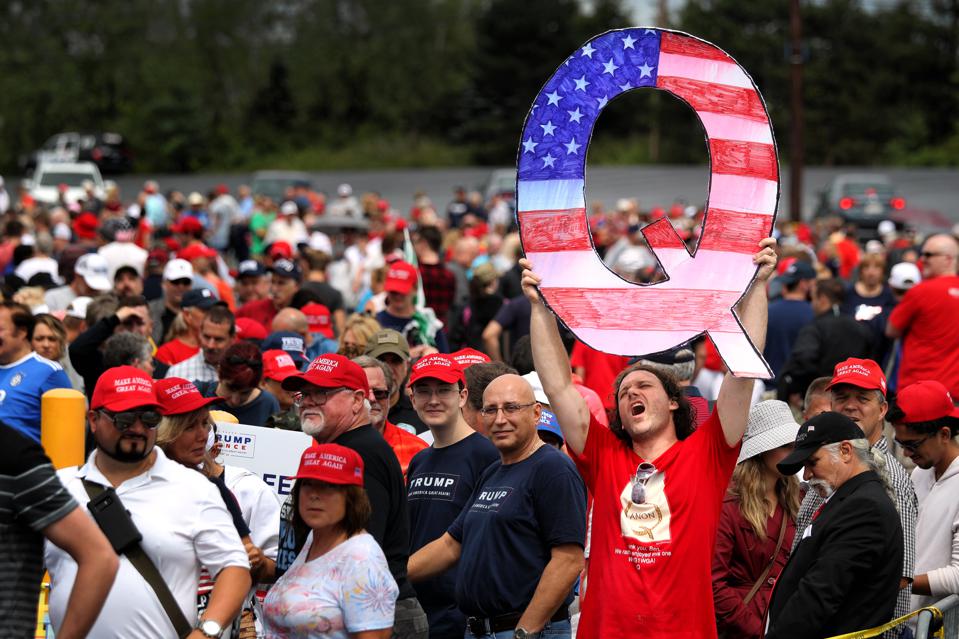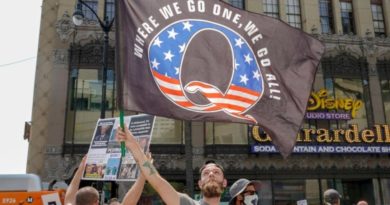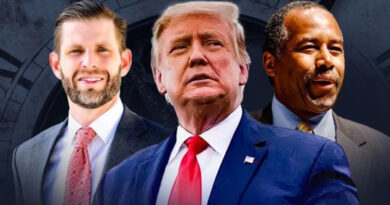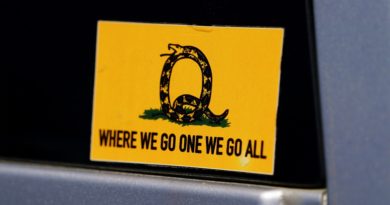QAnon Traffic Declined After Facebook Cracked Down
Topline
In the weeks after Facebook announced it removed thousands of QAnon-linked groups and pages, the platform — and its partner, Instagram — saw a noticeable decline in traffic of QAnon hashtags and phrases, a sign social media companies can play a large role in limiting conspiracy theories.

WILKES BARRE, PA – AUGUST 02: David Reinert holds up a large “Q” sign while waiting in line to see … [+]
Key Facts
Traffic for QAnon phrases and hashtags declined after Facebook announced its crackdown on August 19, according to data gathered using the Facebook-owned CrowdTangle search tool.
Interactions on Facebook for the QAnon rallying cry acronym, #wwg1wga (which stands for “Where we go one, we go all”), declined from 20,500 in the week before Facebook announced its restrictions, to 8,100 in the first week of September; on Instagram, interactions for the #wwg1wga phrase fell from 1.5 million to 960,000 during the same period.
Traffic for the phrase “The Storm,” another popular QAnon rallying cry, also declined during the same period on Facebook and Instagram.
Interactions for the phrase “QAnon” have increased on Facebook since mid-August, but most of the top posts are by prominent, verified accounts debunking it, or reporting on President Trump’s embrace of it (mentions on Instagram fell from 1.55 million to 962,000).
Facebook’s restrictions — along with those of other social media platforms, such as Twitter — may have also contributed to the decline in web traffic to one of the most prominent QAnon sites, QMap, according to data cited by the Canadian Broadcasting Group:
Facebook did not immediately respond to a request for comment from Forbes.
Key Background
QAnon believers think President Trump is locked in a struggle to take down a “deep state” system of liberal politicians, government officials and Hollywood celebrities that are running an international sex-trafficking ring (an FBI memo released last year warned that QAnon’s followers could be possible “conspiracy theory-driven domestic extremists”). After first popping up on the fringe of the internet in 2017, interest in the QAnon theory has exploded this year amid the pandemic. In August — after years of taking a hands off approach to managing misinformation and conspiracy theories — Facebook followed Twitter in cracking down on the theory, after an internal probe showed the theory had spread like wildfire on the platform. The social media platform announced on August 19 it removed 790 groups, 100 pages and 1,500 ads connected to QAnon on the social media platform and restricted over 10,000 accounts on Instagram.
Tangent
Facebook’s crackdown comes as the theory moves from the fringe to some corners of the Republican Party. Multiple candidates running for office this year have openly promoted the theory, and Trump has refused twice to disavow it. After dismissing the conspiracy “out of hand” during an interview, Pence will reportedly attend a fundraiser hosted by QAnon supporters, according to the Associated Press.
Surprising Fact
While Facebook and Twitter have moved to limit the theory, candidates on Twitter touting the conspiracy continue to thrive. In August, Forbes identified 15 candidates that are verified on Twitter who have promoted QAnon with few restrictions and hold massive followings. Twitter told Forbes last month it is considering changing its policy.
What To Watch For
How QAnon followers continue to circumvent restrictions. Last month, the New York Times reported QAnon supporters had hijacked the #SaveTheChildren hashtag, a legitimate movement meant to bring attention to child trafficking.
Further Reading
Twitter Cracked Down On QAnon—But Candidates Touting The Conspiracy Still Thrive There (Forbes)
QAnon Supporter Greene Wins Primary And Gets Push From Trump (Forbes)
Trump-Backed Candidate Marjorie Taylor Greene Promotes 9/11 Conspiracy Theory (Forbes)
‘The Storm Is Here’: GOP House Candidate Tweets QAnon Rallying Cry After Trump Retweets Her (Forbes)


